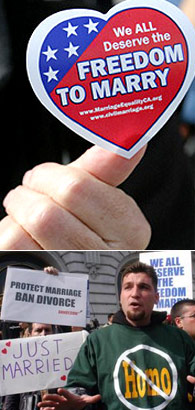Just as pro-queer rights group rejoiced fleetingly over the Massachusetts High Court decisions challenging the constitutionality of banning homosexual marriages, they were swept up in yet another uphill battle - this time in the legislative chambers. In the same week, recently elected San Francisco Mayor Gavin Newsom permitted the issuance of same-sex marriage certificates.

A woman passes out stickers in support of gay marriages (top pic) as a member of Repent America, a religious group from Philadelphia, speaks out against same-sex marriage outside the San Francisco City Hall.
"It's all semantics," is the common response. "It's just the term 'marriage' that people are hung up with. They're all the same anyway."
But it's not just semantics. First, words and terms have much greater social significance than they superficially seem. By the very simple act of naming, you lay claim and possession of that object, person, ideology, or that institution. If gays and lesbians can't even call a marriage "marriage," what exactly can we claim then?
It's not knit picking. Proponents of civil unions are essentially revoking the "separate-and-equal" argument utilised in Jim Crow laws. If a civil union is essentially the same with marriage, it's only right for it to be declared the same thing. Why the equivocation and hypocritical double standard? We should never ever buy the illogical and downright discriminatory "separate-and-equal" argument.
And second, a civil union is not the same with marriage. civil union is a separate system that's simply unequal. It's not even sufficient. It's nothing but a cheap gaudy imitation of the real deal. As much as you would spot a faux Made-in-China Fendi bag a mile away, civil union should raise your bells and whistles and red signals.
It's a tokenistic inferior double-standard institution of what a marriage is. I acknowledge that civil union does offer and protect similar rights to a marriage. But they're nowhere close. Rights of immigration, visitation, and privileges of Social Security and taxes - all in all, over a thousand (roll that off your tongue again: a thousand!) fundamental rights provided to the heterosexual married couples that is not extended to civil union partners. We should accept anything less than.
And we should learn from our history that a separate system of anything, especially those limiting a particular group of people, is discriminatory. The landmark case of Brown v. Board had set the precedence and it should be an important reminder that providing a separate inferior double standard is anything but equal. Let's not let that fight for civil rights and fundamental liberty go in vain.
In the 60s, racism was prevalent and the social issue was not resolved prior to the extension of equal opportunity and access to public services to the African Americans. It takes the case of Brown to jump-start the fight against racism. The social discrimination against that minority group was dealt with, hand in hand, with legal and institutional discrimination. I'm not saying that racism is completely non-existent today. But at least, the era of state-sponsored institutionalised separatism is over.
Similarly, we cannot expect acceptance of homosexuals and tolerance against homophobia to exist before we demand an equal institution of marriage to homosexuals Like the African Americans in the 60s, this would be the public policy that would jump-start the continual struggle against homophobia and earning our much-deprived equality.
The queer rights movement is an extension of the civil rights movement; the move towards gay equality institutionally and socially is based in the identity politics of the 60s civil rights era. Our institute of marriage doesn't need protection, but our civil rights do.
The people of that generation, even though most don't belong to the particular group of minority, had acknowledged that discrimination against one particular group is wrong. They took steps to rectify that inequality.
For our generation, the wrong is civil union and the time to fix it is now.
Born and raised in various parts of Asia, Jason Woo is a writer presently based in Los Angeles. His column is also currently featured on newsjourney.com and available for syndication. You can contact him at mail@jasonwoo.com.
